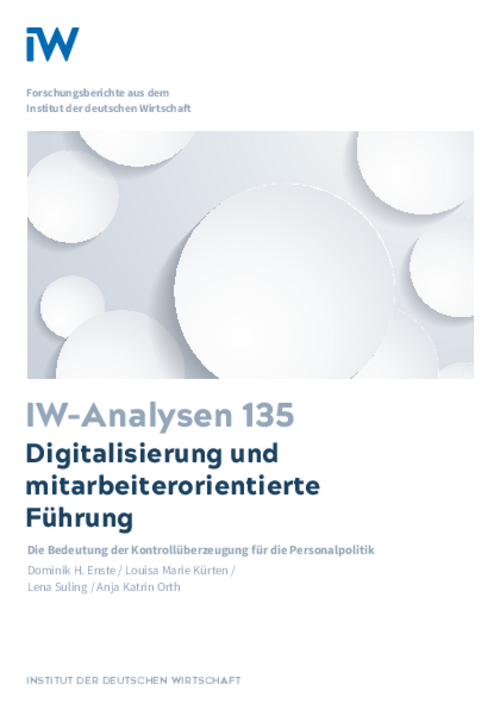Current developments at the workplace, such as digitalization, the demographic transition or the shift from a focus on shareholder value to a stakeholder approach, are bringing about rapid change.

Digitalization and Employee-Oriented Leadership: The Importance of Locus of Control for HR Policy
IW-Analyse

Current developments at the workplace, such as digitalization, the demographic transition or the shift from a focus on shareholder value to a stakeholder approach, are bringing about rapid change.
As management seeks orientation in this turmoil, the debate about “good” leadership is coming into its own again. Traditional leadership models and styles no longer seem suited to the volatility and uncertainties of the digital age and are increasingly being called into question. This transformation is impacting on managers, whose leadership is having to be more flexible, more adaptable and – not least due to the shortage of skilled labour – (even) more employee-oriented. The present analysis therefore focuses on personality traits and especially on employees’ locus of control – that is to say, their belief in their ability to influence their situation. The authors’ aim is to identify, both theoretically and empirically, the form of leadership best suited to a given type of employee in a given situation. Their main conclusion is that workers with an internal locus of control contribute more, and more effectively, to overcoming professional challenges and are better equipped to do so than those with an external locus. With the appreciative, employee-oriented leadership outlined here managers can increase job satisfaction and economic success.

Dominik H. Enste / Louisa Marie Kürten / Lena Suling / Anja Katrin Orth: Digitalisierung und mitarbeiterorientierte Führung – Die Bedeutung der Kontrollüberzeugung für die Personalpolitik
IW-Analyse

More on the topic

What factors influence the career ambitions of people with disabilities?
Many companies in Germany report having difficulties not only in recruiting employees, but also in filling vacant management positions.
IW
Leadership in transformation: Megatrends and management as a driver of change
Leadership dynamics in companies are subject to constant change in order to meet the challenges of their time. Today, the greatest influences result from developments such as demographic change, globalization, individualization, structural change and ...
IW